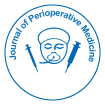
Journal of Perioperative Medicine
Open Access
ISSN: 2684-1290

ISSN: 2684-1290
Opinion Article - (2024)Volume 7, Issue 2
Perioperative medicine, a rapidly evolving field in healthcare, focuses on optimizing patients' health before, during, and after surgical procedures. While traditionally the primary concern has been the success of the surgery itself, attention is increasingly turning to the broader health and well-being of patients throughout the entire perioperative journey. Maximizing patient health and wellness in this context involves a multidisciplinary approach that addresses not only the specific surgical intervention but also the patient's overall health, lifestyle, and individual needs.
Preoperative optimization is an important component of perioperative medicine. This phase begins with a comprehensive assessment of the patient's medical history, current health status, and any risk factors that may affect the surgical outcome. By identifying and addressing underlying health issues such as hypertension, diabetes, or heart disease before surgery, healthcare providers can reduce the risk of complications and improve patient outcomes. This may involve medication management, lifestyle modifications, and consultations with specialists to ensure that the patient is in the best possible condition for surgery.
Nutrition plays a vital role in preoperative optimization and overall patient health. Malnutrition is a common concern among surgical patients and can significantly impact recovery and outcomes. Therefore, nutritional assessment and intervention are essential components of perioperative care. Patients may receive guidance on dietary changes, nutritional supplements, and hydration strategies to support their health and recovery before and after surgery.
Another key aspect of perioperative medicine is prehabilitation, which involves preparing patients physically and mentally for surgery. Prehabilitation programs may include exercise routines, breathing exercises, and stress-reduction techniques to improve patients' strength, endurance, and resilience before undergoing surgery. By enhancing patients' physical and emotional wellbeing before the procedure, prehabilitation can help reduce the risk of complications, shorten recovery times, and improve overall outcomes.
During the surgical process itself, perioperative medicine focuses on optimizing patient safety, comfort, and outcomes. This involves close coordination among surgical teams, anesthesia providers, and other healthcare professionals to ensure that the procedure is performed safely and efficiently. Advances in surgical techniques, anesthesia protocols, and perioperative monitoring have contributed to significant improvements in patient care and outcomes in recent years.
Postoperative care is a critical phase of the perioperative journey, where the focus shifts to supporting patients' recovery and rehabilitation. Pain management is a key consideration during this time, as effective pain control is essential for patient comfort and well-being. Perioperative pain management strategies may include a combination of medications, nerve blocks, and alternative therapies to minimize discomfort and facilitate recovery.
Rehabilitation and physical therapy are also important components of postoperative care, helping patients regain strength, mobility, and function after surgery. Rehabilitation programs are significant to each patient's individual needs and may include exercises, stretching, and other interventions to promote healing and recovery. By providing comprehensive support during the postoperative period, perioperative medicine aims to optimize patients' long-term health and quality of life.
In addition to addressing the immediate medical needs of patients, perioperative medicine also emphasizes the importance of holistic care that considers the patient's overall well-being. This includes attention to psychosocial factors such as anxiety, depression, and social support, which can impact recovery and outcomes. By addressing these broader aspects of patient health and wellness, perioperative medicine seeks to optimize the entire perioperative experience for patients and improve long-term outcomes.
In conclusion, perioperative medicine plays an important role in maximizing patient health and wellness throughout the surgical process. By taking a comprehensive, multidisciplinary approach that addresses preoperative optimization, intraoperative care, and postoperative rehabilitation, perioperative medicine aims to improve patient outcomes, enhance recovery, and promote long-term health and well-being. As the field continues to evolve, advancements in perioperative care will undoubtedly further enhance the quality and safety of surgical procedures for patients worldwide.
Citation: Wallace S (2024) Maximizing Patient Health and Wellness with Perioperative Medicine. J Perioper Med. 7:217.
Received: 04-Mar-2024, Manuscript No. JPME-24-29992; Editor assigned: 06-Mar-2024, Pre QC No. JPME-24-29992 (PQ); Reviewed: 20-Mar-2024, QC No. JPME-24-29992; Revised: 27-Mar-2024, Manuscript No. JPME-24-29992 (R); Published: 03-Apr-2024 , DOI: 10.35248/2684-1290.24.7.217
Copyright: © 2024 Wallace S. This is an open-access article distributed under the terms of the Creative Commons Attribution License, which permits unrestricted use, distribution, and reproduction in any medium, provided the original author and source are credited.